
June 23, 2008
 The Last Great American Comic-Con—50+ Thoughts on HeroesCon 2008
The Last Great American Comic-Con—50+ Thoughts on HeroesCon 2008

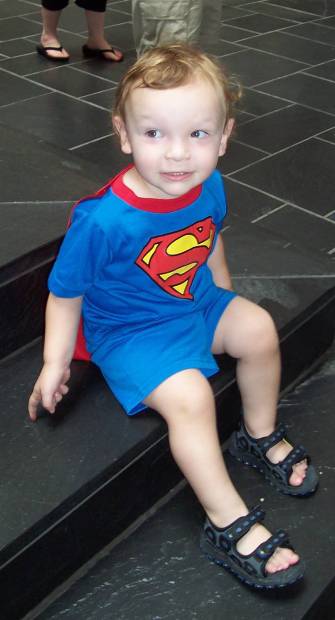 By Tom Spurgeon
By Tom Spurgeon
* I'll add to this over the next few days as my ability to process information and get it on-line improves, and will provide more links as well. Until then, here are some initial thoughts on the weekend just past, spent at
HeroesCon in
Charlotte, North Carolina.
* In general, HeroesCon is as advertised: a classic American comic-book convention with a ton of friendly people and appreciative crowds. People kept saying "It's like
San Diego [x-number of] years ago," which seemed reasonably apt: mainstream comics-driven, significant indy presence, families in attendance, mostly group socializing... I enjoyed myself quite a bit.
* I should probably mention: I spent a week in Chicago working before heading down to Charlotte. Chicago's a pretty great comics town, not because of the practitioners or institutions that call it home, but because it has a great, natural audience for the form. That's resulted in great shops, a traditionally well-attended con,
Bill Mauldin and
Jeff MacNelly as editorial cartoonists in the last half-century and
Chris Ware for free once a week or so since 1991. Visiting the city with big shoulders and its great comics shops is a nice way to move into convention-going mode.
* As for the trip itself, air travel isn't impossible... yet. It's just harder now, something to which you have to pay attention whereas ten years ago you might have been able to take it for granted when making con plans. In 1999, I flew from Seattle to an
SPX for $138 round trip. Those days are gone, and now there's not just the sick thrill of maybe or maybe not getting a semi-cheap fare but a growing certainty you won't. I can't imagine this won't have a bleeding-from-the-gut effect on how people approach convention-going for the next few years. As a regional con with a national audience, particularly in terms of professionals, HeroesCon may feel this more than most.
* I took my brother to snap photos. Everyone was nice to him. Everyone in Charlotte was nice, period.
* We were greeted at the airport by a volunteer couple whose names I can no longer remember, driving a white van festooned with Heroes decorations. On the way in we talked about Charlotte as a place to live, as a banking center, as a city that has been suffering drought. It's a much nicer way to head into a convention weekend than some of the bizarre conversations you end up having with cab drivers in San Diego and and
New York.

* Charlotte has one of those petite downtowns that's still more of a place where people work than where people live. For instance, there wasn't a big grocery store within shouting distance of convention-going central, at least not one I could find. You could also pretty much walk in the center of the streets once it got past midnight. Very clean, very much under construction (with some of those condos), and featuring a lot of public art.
* The convention center was flanked by the two convention hotels, the
Westin and the
Hilton. The Westin is the more traditional convention home and the one where the vast majority of pros seemed to be staying. I was over at the Hilton. They weren't very far apart, and the ability to run back to the hotel from the con floor was a huge bonus given how tough this is in every case but a few hotels when in San Diego.
* The Hilton was a quality hotel despite a few grumpy user reviews on the travel sites. It gave off that slight hint of defensive attitude that makes me think it has taken to heart the criticism it may not be totally worth what one might expect from such a fancy-looking place. I had no complaints. Free business center Internet, cheap Y memberships, comfortable beds, big TVs... I liked it just fine.
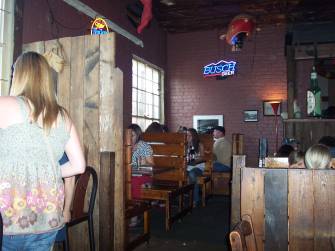
* On Thursday night, we ate at one of the recommended restaurants,
Lupie's Cafe. It was stuffed with locals and featured a no-nonsense wait staff, diabetes-inducing iced tea, and excellent comfort food. We could have ordered only our shared appetizer and had enough to eat. The eating was mostly good in Charlotte, although a few more restaurants and a bit more in terms of casual, year-in, year-out familiarity with same in the immediate area might have been welcome. It was hard to switch gears, if you know what I mean. I ate a meal in a small soul and southern food restaurant about three blocks away from the convention center which was just fine and that seemed a place reasonably popular with con guests.

* After Lupie's, we decided to walk the 2.5 miles back into town in the hopes of not feeling like we had distended bellies when we went to sleep that night. It was very pretty out. The avenue was filled with occasional, sudden nature scenes like the one above. People were on their porches, although the homes for sale seemed to be running in the $350K range which didn't really support
the Taylor Family vibe the neighborhood gave off. We walked past a baseball game. It felt like summer.
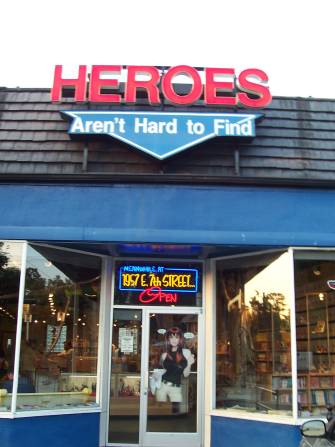
* By accident we trudged past the
Heroes Aren't Hard To Find retail location. I can't remember the last time I walked by a comics store by accident.
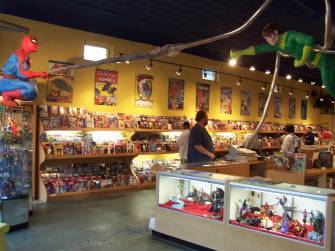
* Heroes was a much better store than I thought it would be. I'd seen photos, but they emphasized the impressive Spider-Man/Doctor Octopus ceiling sculpture, which did not prepare me for the assault of product the above photo might hint at. It was really, really well-stocked. Best of all, it seemed like they were doing a ton of regular business for a Thursday night. I thought it would be a good store, but it seemed like a model one to me in a lot of ways.
* One of the old-school touches HeroesCon offers is that there's a centralized social hub that doesn't yet feel overwhelming or scary: the lobby bar at the Westin. This meant a lot of cross-group interaction. At one table in the corner on Saturday night, for instance, about 1 AM, I saw an indy comics publisher, a well-established indy comics cartoonist, a popular mainstream comics writer, an up-and-coming mainstream comics writer and popular blogger, a newer indy comics publisher, a painter/cartoonist, a hardcore well-respected arts comics publisher, a cartoonist with about two books under his belt, and an absolute Hall of Fame alt-comics legend. It was nice, although there was a bit of sameness to the evening's activities by the end of the weekend, even with satellite events.

* As you can see, the Hilton has a ways to go to compete with the Westin in terms of its bar as a social hub.
* I met the mysterious
Ben McCool. McCool seemed to have an effective con strategy worked out, consisting mostly of staying in his room, drinking, and watching the Euro 2008 soccer quarterfinals. I appreciated the reports, though, like the emotional collapse of a Romanian team that lost on penalty kicks after leading with less than a minute to go: "It was maybe the most unmanly thing I've ever seen."
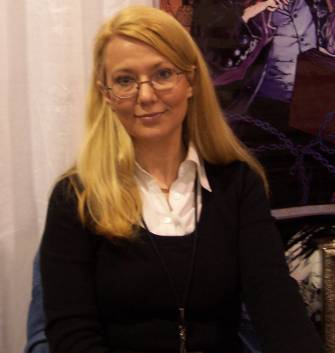
* Either
Colleen Doran actually brought produce to the show for people to eat, or she curses in a food-centric, euphemism-filled language I can only hope to one day understand.

* Friday morning at the show was weird because the Internet crackled to life that day with rumors of big, impending news at DC Comics, which given the shape and nature of
last week's reported performance of Final Crisis #1 made many speculate that Dan DiDio was out. In actuality, this was to be the confirmation that
John Nee had resigned. Speculation remained high all weekend that there were more announcements to come this week -- maybe they've already happened as you read this. Since people were asking me and I think I may actually have negative contacts in mainstream comics right now, I can assume it's a) of high interest, b) potentially big, c) still a mystery to a lot of folks exactly what, if anything, may happen.
*
Here's a rundown of DiDio's recent performance that doesn't flatter DC's last several months.
* Two comics professionals working the mainstream side of the business commented to me that given last week's tough news regarding sales figures and at least one freelance personnel issue at the company that generated some on-line heat, DiDio was admirably focused, upbeat and enthusiastic in his dealings with folks at the show. He ran the DC Nation panel.

* If there's anything better than starting your walk to a show by seeing a trio of tiny cub scouts walking down the street holding hands, I don't know what it is.

* The convention center seemed like a nice facility with multiple meeting halls and the ability to take on the convention and few wedding and graduation events without much conflict. The convention hall itself is set into the floor; you descend an escalator to get there, and it's fairly large. It looked a little bigger to me than pictures of
Emerald City ComiCon; it was maybe the size of the first couple of Wizard World Chicago shows...? Twelve aisles in all, I think, left to right, about 15-20 exhibitors front to back.
* I am all for all cons everywhere hiring a bunch of older security ladies that cackle and then threaten to beat you every time they can't see your badge.
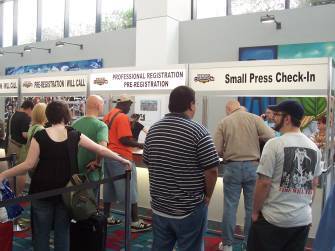
* Registration seemed fine and steady, never overwhelming, much like attendance. Everything seemed to be tackled registration-wise with a crackling, homespun alacrity. My experience, anyway.
* The crowd was really old-school, too. Not a ton of costumes, but those that were on-hand seemed to please many of the convention-goers. It was mostly male, but not overwhelmingly so. A lot of superhero t-shirts. Several families that seemed actively involved rather than some members dragged along.

* It seemed like a great place to shop. Not only was there a ton of new material on hand from various individual artists and publishers that covered a wide array of comics approaches, not only was there a ton of original art (
Roger Langridge! Jaime Hernandez! Richard Thompson!) but there was an avalanche of discounted comic book material. I saw so many cartoonists showing off their finds -- everything from
Little Lulu to
Jack Kirby Jimmy Olsen comics to strange 1980s black and white books to late '60s Marvels -- many of which were had for a dollar or less. I could have dropped $2K in there
easy just in discount comic books.

* It also seemed like an
extremely tough place to sell art comics. Business at the three big hardcore art comics locations --
PictureBox,
Bodega Distribution (pictured above) and Buenaventura Press -- was gallows-humor-inducing slow all weekend.
AdHouse and
Sparkplug did a bit better.
Marc Arsenault's Wow Cool did very little business.
Top Shelf seemed to do OK, but maybe only OK, and they've built up an audience over several years of attendance. Individual indie-island sellers ranged all over the place in terms of being able to attract buyers.

* this is the first of 14 pictures I have of Dan Nadel (of PictureBox, Inc.) where he doesn't have his eyes closed.
* Apparently,
Chris Staros has been on the road for something like 11 weeks in a row.
* It's hard to say what could be done to goose this aspect of sales. Attending a bunch of conventions in a row seemed to be one answer, but not everyone can afford to do that and take multiple hits to build that kind of audience. It may also be that the natural audience for things like
Goddess of War or an over-sized Charles Burns art book just doesn't think in terms of being able to go to a comics show to find that stuff. I think one thing that might be done is to maybe explicitly organize sales of remaining stock directly to retailers in the area in attendance.
* By the way, you really need to buy
Goddess of War.

* I moderated a bunch of panels that were recorded and will be up at
The Dollar Bin. I'll do a separate post when that happens and when I'm able to get to the site myself. But right now some quick notes.

* Panel one: for me, the highlight of Covering Comics: Criticism, Reportage and Gossip seemed to be a discussion of a a growing schism between sites that feel they must work within the industry they cover and maybe pay the price for doing so and those that opt for a more traditional, maybe confrontational and maybe as a result removed from a lot of the discussion model. Another thing I found interesting is that
Matt Brady of Newsarama noted the growing sophistication of the big comics companies as media companies, and a growing tendency to want to break publishing news through their own on-line outlets.
* I really liked asking Matt Brady questions; I had never met him, at least not that I could recall. I was also impressed with the no-bullshit approach to many of the questions the Creative Loafing guy evinced; I can't remember his name, either, because I am old. I'm told it's Carlton Hargro! Anyway, he was really good.
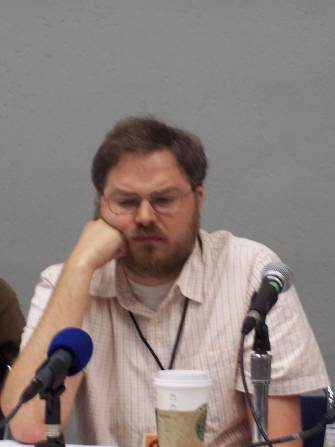
* Tim Hodler of
Comics Comics later told me that he tried to keep people from being able to read his disappointment if not slight dismay over the direction of the conversation during the journalism/criticism panel. On behalf of everyone in comics, I'd like to invite Mr. Hodler to attend poker night any time he wants.
* That might be my favorite picture from the show, incidentally.
* Panel two: I'd never done a State of the Industry panel with mainstream comics personalities before, and what fascinated me about that was the mix of confidence and admitted self-doubt regarding whether or not the instincts of 45-year-old men was always right on when it came to providing entertainment for people much younger than that. It was interesting to see a couple of them confront an audience member who complained about spoilers by simply telling him to turn his computer off. DiDio answered the question about DC's rough week by noting the overall competitiveness of the market right now, and admitting some of the inherent difficulties of working with decades-old icons in terms of keeping them new
and familiar.
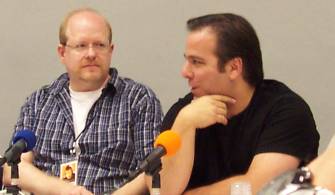
* Mark Waid and Jimmy Palmiotti are both very funny. Watching them work a panel is like watching a stand-up routine from someone like
Dom Irrera. Waid seemed the most enthusiastic of all the panelists in terms of getting his company's work on-line.
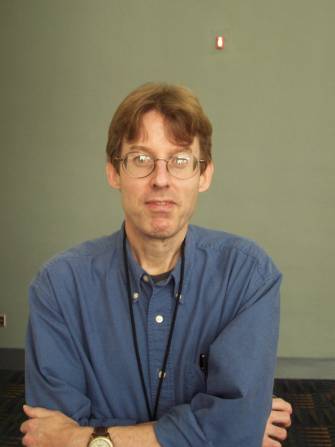
* Panel three: I greatly, greatly enjoyed meeting and talking to Richard Thompson, of
Cul De Sac, although I wish there were more than seven other people equally excited enough to make the trip upstairs! Thompson said that
Cul De Sac launched with 75 clients and is now, less than a year in, at 125. He suggested that a future area of exploration for the strip may be in roping in a few more kids of Petey's size. He joked about the high concept of the strip being a family that mostly likes each other, although in a later aside he hit on what it's really about, I think, the way that parents look at kids and kids look at their parents and the world. He shared a memory that in the neighborhood where he grew up, he knew which houses had water faucets where you could get a drink of water, and how that's not exactly knowledge you keep handy when you're an adult.
*
The Cul De Sac collection coming in September will contain 30-40 of the strip's previous iteration as a
Washington Post-only feature to fill out the volume. He also said that that book's foreword writer, Bill Watterson, made contact with him by e-mailing him. That's a fairly terrifying name to have pop up in your inbox.
*
you're reading his blog, right?

*
Roger Langridge is funny.
* I hadn't seen
Mike Rhode in ten years; hadn't seen Marc Arsenault in a dozen.
* Panel four: The Creative Households panel on Friday was a lot of fun: well-attended, too, with nary a bail-out.
Evan Dorkin and Sarah Dyer's daughter kept hitting the microphone like it was bongos, which made everyone laugh. Dorkin got some comedic mileage out of people accidentally cursing in front of his kid.
Stuart and Kathryn Immonen were interesting in that they had been working together for a bit longer than the other couples, I think, and seemed more assured in terms of negotiating the time commitments that arise to dictate the working hours and such. The Immonens also may have told the most brutal credit-dropping story of all time.
* Panel five: a few people told me afterwards that The New Art Comics made them fired up to buy more alternative and arts comics, so I guess that's a good thing. There was a lot of discussion about the difficulties of cracking the current comic shop market beyond "the good ten stores." There was also much discussion of the heated, recent debate over the $125
Kramer's Ergot #7, which I never quite understood as an item of controversy (Xerox pages even at 35 percent of natural size looked
gorgeous; that book should kill).
Sammy Harkham was very funny and articulate. All three panelists were.
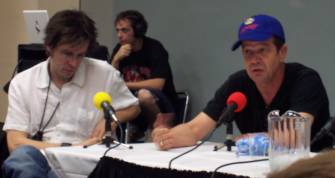
* Panel six: the comics writer
Matt Fraction later told me he thought the Collaboration and Storytelling in Today's Comics panel was the best he'd ever been on. It was a good one, which made me feel better because I struggle with the mainstream American comics-related panels. Through the help of some audience questions, we were able to cover a wide range of collaborative relationships, up to and including the kind of line-wide planning with multiple creators that goes into a crossover event -- Fraction had a killer line about how having to deal with one of those things when you're not invited to the initial planning session was like dancing to music you could sort of hear in the room next to yours. The panel ended with the various folks telling stories about how they quit their day jobs. Darwyn Cooke's was devastating, so go listen to it when it's up.
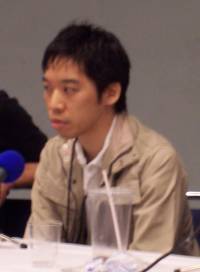
* I'd never met Cliff Chiang before that panel (nor Barry Kitson, both of whom were great). I was stumped as to whether he's the only editor at a comics company to ever quit to then establish a career as a comic book artist, as opposed to an artist that becomes an editor or an editor that leaves to write.
* Panel seven: Conversations: Evan Dorkin and Jaime Hernandez was the only panel of mine not recorded because of scheduling conflicts, but it was maybe my favorite of the show. Jaime told stories about trying to build his style as a young artist, including saying that Moebius was the last influence he brought into his art and that if you check
Love and Rockets #1 you can see flourishes like Moebius' in there. Dorkin made a funny joke about feeling like a Mole Man minion on a panel with Galactus, and also lamented the comic book format, particularly for humor cartoonists. I had a great time at that one.
* Panel eight: the Webcartoonist panel was interesting to me because I get the sense that a lot of the same questions are asked at a lot of these panels and it's increasingly difficult to answer them with any certainty. One item of agreement seemed to be that doing a good comic is the best marketing tool, and that should come well before any thought of monetizing it, or trying to do so.
Julia Wertz killed me when I asked the panelists if they felt their audience got to know them and root for them to succeed, and she said she felt that people got to know her a bit and were now rooting for her to fail.
* Panel nine: religious-themed panels are always tough, I think because audience members have very different ideas over what such panels should cover. Plus I'm kind of a mushmouth. Happily, I think this panel would make the best transcript of all the ones I was lucky to do, as Sammy Harkham and Kevin Huizenga talked in forthright fashion about dealing with such issues in their art. Both were adamant they didn't want to proselytize or even represent their own viewpoints in their work as much as allow their characters to explore what they feel and think. Huizenga mentioned that he heard back about "Jeepers Jacobs" that it helped allow some of his friends on either coast to understand the mindset of someone with religious beliefs. Sammy Harkham talked about observing Hasidic practice without really embracing Jewish culture on the same, involved level.
* I'm so not used to buying comics that I nearly walked away with one I bought from
Hope Larson without paying. Sorry, Hope! The recipient loves the book.
* I had coffee with
Heidi MacDonald of The Beat on Sunday morning. An acquaintance told me later that seeing the two of us chatting together "totally freaked" him out.
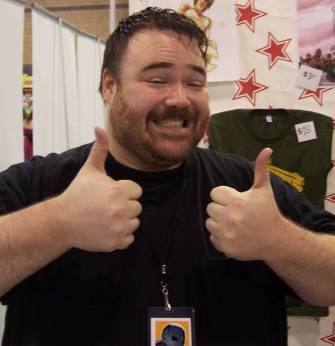
* I don't know who this guy is, but that's an awesome picture. (Several of you subsequently wrote in to say it's
Kevin Mellon).
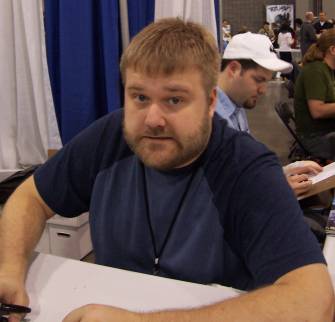
* I also liked this one of
Robert Kirkman. A young man talked to me about how generous Robert Kirkman was in his interaction with his fans, particularly new ones, being really solicitous of them and even making a gift of certain collections to one or two as the opportunities arose.
* It sounds stupid, but on some level I was sort of heartened to hear people talk about Kirkman's
Walking Dead this weekend as a comic to emulate, because frequently there's an aversion to emulating anything in comics except for really crass trends.
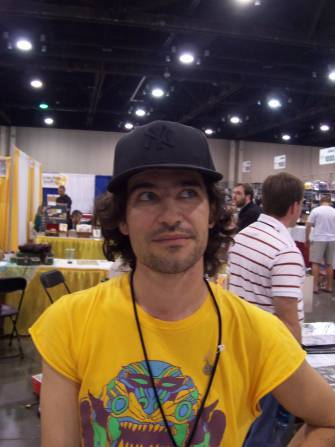

* Some of the pros, like
Frank Santoro and
Alex Robinson here, are getting good enough at the media game they know that an interesting photo can be had by not looking directly into the camera.
* If there's anything more nerdy and fun than listening to Frank Santoro expound on the damage that photo referencing and Photoshop effects have done to American comic books, I don't know what it is.
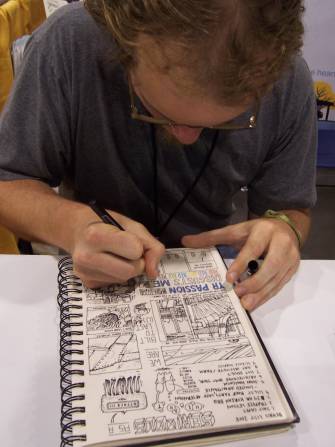
*
Josh Cotter drawing in his notebook, which "only got a little wet" during a Saturday downpour when many were caught outside on their way up College to the art auction.
* There seemed to be a ton of sketching and sketch sales at the show, although maybe I'm just now noticing how popular that is. I swear it's different now than it was 10 years ago, though; I'm not sure why. It's not quite to the level of European shows and their super-elaborate sketches -- and of course many of the sketches are bought and sold and/or commissioned -- but it's getting there.
* Speaking of the art auction,
Dustin Harbin is an awesome sight to behold in his white, pinstripe suit working the crowd like it's a camp revival.
* If there was a book of the show, it probably came out from Gold Key in 1966.

* I had a long talk with
Chris Duffy at the art auction. He described
Al Feldstein (I think that's him above) as the "ultimate editor," because he got such great work out of someone else's project, which is an interesting perspective. I got to meet
Jim Scancarelli, who apparently can see the convention center from his home but hadn't been over in a few years.
Irwin Hasen,
Nick Cardy and the great
Herb Trimpe were among other over-60 folks on hand.
* "I lost my credit card... and
Brian Ralph!" was probably the funniest late night line I heard.
* My thanks to Andrew Mansell for taking such good care of me and helping make sure people got to their panels on time. I hope he survived the weekend's stresses OK. All of the volunteers and the youthful Shelton Drum himself were extremely pleasant people.
* I heard that two academics were working on
Jack Kirby biographies. I think they should pick partners, jump in a pool and have a chicken fight to decide on only one book.
* I was greatly appreciative of how many of you came up to say hi and that you liked the site. That was awesome, thank you.
* People were already talking about
Jeff Smith's appearance at the 2009 show.
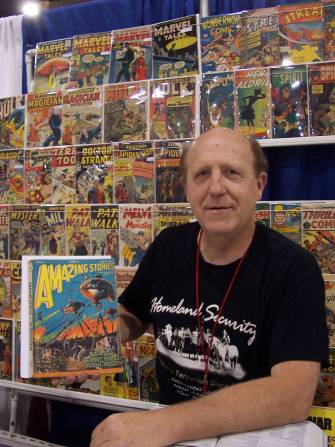
* As always,
Bob Beerbohm endures.
*****
photos by Whit Spurgeon
*****
*****
posted 9:15 am PST |
Permalink
Daily Blog Archives
November 2019
October 2019
September 2019
August 2019
July 2019
Full Archives


